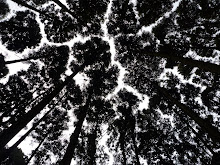I have been spending the evenings half watching television and looking through museum digital databases for Fuji-san images. This is a 1949 calender published by Fujisawa Pharmaceutical Company and is in the British Museum. The upward-looking composition with a solitary grey cloud in a large field of pink sky creates a striking image. This feeling is given an uncanny twist with the unusually placed heads of the two female "Americans" right along the base of the image, as though they were humpty-dumpty on the edge of a wall, or body-less phantoms.
I was wondering whether it had been mislabeled as a Fuji image till I enlarged the image and saw the companies logo.
The woodcut print is titled Ginza no tasogare-doki - Dusk in Ginza and is by the artist
A suit and one grey painting brush are sufficient. The neon of the PX is still like a dream. The new culture of Japan comes flashing from those sharp words. When one walks here, there comes a feeling that the days when we were struck to the ground are already from a distant world. Probably everybody would like quickly to wash away their hateful memories. The narrow pavements make our shoulders rub together. Through this congestion tall Americans stride. Already there is a sort of magnificence here, but the truth is that Japan is under Occupation. It is not necessary to wait for dusk. People have already lost sight of themselves.
There are 445 Onchi pieces in the Museum's collection, unfortunately most of it is not digitally archived but there are a few more Fuji pieces to save for a another post.
Update:
The store in the image is the Tokyo PX, the post office and stores for American servicemen, then located in the Wako Store in Ginza. Ginza was the fashionable going out district in post -war TokyoI don't know how I missed this detail before in the notes but the use of Mt Fuji in the logo above is a pun, as the character used for Fujisawa Pharmaceutical has nothing to do with the mountain. The writer of the object notes also comments that the Fugaku Publishing company, which published the calender and other works by Onchi and other post war print artists also uses Fuji in the logo- Unfortunately I couldn't find a scan on the interweb of their logo- only expensive rare books...
Update #2:
Lawrence Smith speculates that Onchi poetic text was for a Japanese audience as it was printed in Japanese only, which was unusual during the period of American occupation.






Beautiful poetry. The piece lends itself to embroidery, like those patches you had made.
ReplyDeletenice idea- the museum had a few other pages from the calender all with quiet interesting inscriptions- no images scanned unfortunately. If you put "Fujisawa Pharmaceutical Company" in the search box on the research page they should come up.
ReplyDeleteMany of the Onchi articles in the collection are illustrated books of poetry. I guess some where his own as the bio says he was also a poet. From the entry it looks as though this inscription was in English and is his own translation.
A most interesting and original post - the image captures its zeitgeist perfectly. As your blog seems to be directing itself towards Mt Fuji, I'm taking the liberty of adding it to the Hyakumeizan blogroll....
ReplyDeleteThank you Project H!
ReplyDeleteI will be re-vamping Tokyo Bird song soon and will be adding you there too.
Correction to my above comment- Onchi spoke German as a second language and the quote above is in Japanese only on the calender. The object notes where a bit misleading.
ReplyDelete